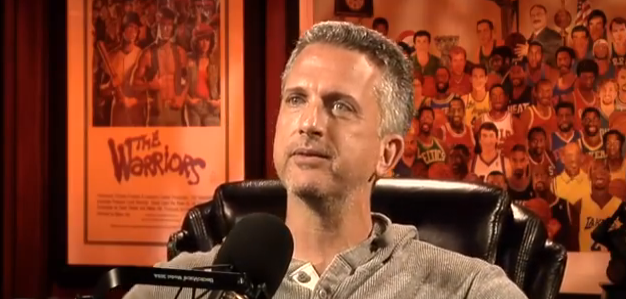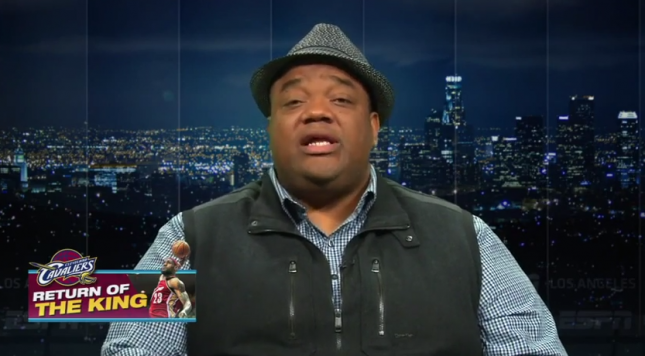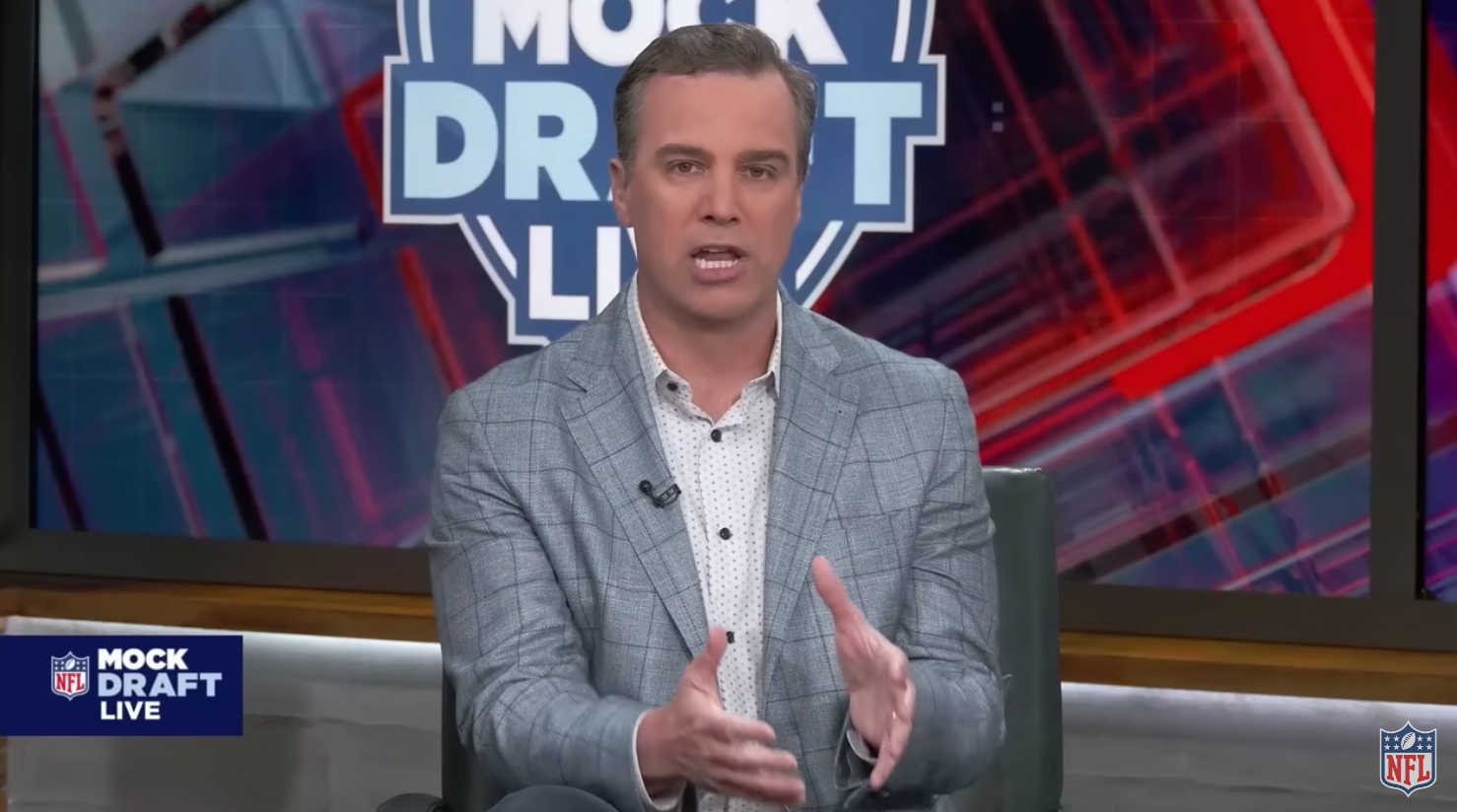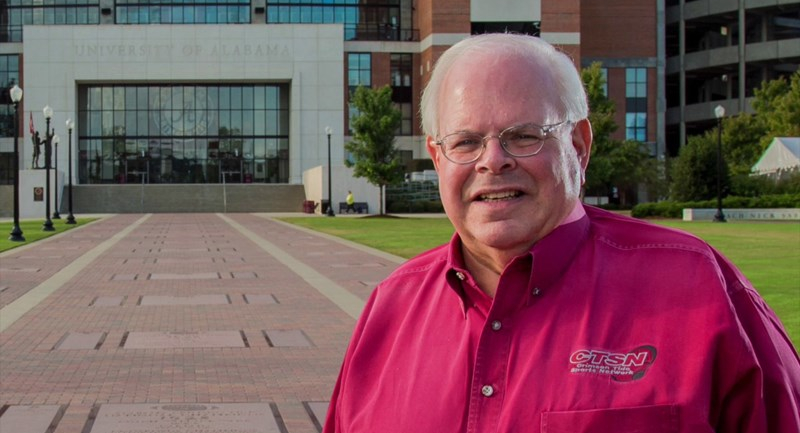Bill Simmons kept quiet for most of his summer hiatus. The Sports Guy was famously and somewhat unceremoniously let go from ESPN before landing a lucrative gig at HBO. His new partnership includes an upcoming television show, but his podcast seems, as of now, independent of that deal.
Simmons also explained on Wednesday at a Vanity Fair event in Los Angeles that he still has to figure out where he’s going to be writing.
Since his time with ESPN formally expired—in other words, since his last check from Disney cleared and he officially became a “former” employee—Simmons has pulled no punches calling out the Worldwide leader on a myriad of topics, most notably the network’s handling of the DeflateGate scandal. Simmons spent time on multiple podcasts in his first week launching the new show going at ESPN’s coverage of the scandal, not to ignore his commentary on Twitter over the last few weeks.
Me and John McEnroe, 3PM, Vanity Fair Summit panel in SF about the future of sports journalism… I wonder if ESPN is gonna come up.
— Bill Simmons (@BillSimmons) October 7, 2015
This, from the Vanity Fair event, extended the conversation yet again:
On Wednesday, Simmons renewed his criticism of his former employer, saying that he “absolutely” believes ESPN avoided overtly criticizing the N.F.L. “The way ESPN has covered the N.F.L. for the last year has been really shaky,” Simmons said. When it comes to coverage of Ray Rice and Goodell, he said, “You didn’t really see it on ESPN. You saw it everywhere else. You start to say, ‘Wait a minute, this is their biggest partner. Are they holding back a little?’”
There’s no question Simmons is right that ESPN bungled the DeflateGate story from the start, but his unabashed loyalty to the New England Patriots makes his criticism of ESPN ring a tad hollow, even if many of his points are valid. To add the coverage of the Ray Rice scandal to the story, however, is where Simmons may have overstepped, catching the ire of one man who helped lead the industry charge on reporting that story, Outside the Lines host Bob Ley.
Yes, @BillSimmons entitled to his own opinions http://t.co/thaWMTrFEJ, but not his own set of facts. See months of OTL, @DVNJr reporting.
— Bob Ley (@BobLeyESPN) October 8, 2015
Simmons responded on Twitter to Ley, seemingly walking back his earlier comments questioning ESPN’s reporting of the Rice story.
– @bobleyespn Not disputing OTL's excellent reporting on Rice and Goodell and you know that. Even had DVN on an all-Goodell pod.
— Bill Simmons (@BillSimmons) October 8, 2015
– @bobleyespn But ESPN's one-sided/flawed coverage on DeflateGate was embarrassing. Jenkins/McCann/Wetzel on Goodell vs non-OTL ESPN? C'mon.
— Bill Simmons (@BillSimmons) October 8, 2015
To say “non-OTL ESPN” isn’t entirely fair, given that OTL is the top investigative arm of that company. What, or in this case who, Simmons probably means by his comment is Chris Mortensen, who has been in Simmons’ crosshairs over his initial DeflateGate reporting since the story broke.
Simmons has expertly positioned himself to go after ESPN for their coverage of NFL scandals in part because of how the narrative of his departure was cultivated. Before his ouster, Simmons was suspended by ESPN for comments he made on a podcast in which he called Roger Goodell a liar.
The two sides to this story are so divergent in ESPN circles there may be no “real story” as to why Simmons was suspended. That said, Simmons has without question won the public relations battle on the matter, as the narrative points to his suspension coming for what he said about Goodell, not for what he said to his bosses. Again, from the Vanity Fair write-up.
“You step away, and you’re just like, wow, this is great. I’m just going to go the movie[s]. Not working is really fun.”
It’s probably even more enjoyable after a year of disputes with ESPN, beginning when the network suspended Simmons last September for referring to N.F.L. commissioner Roger Goodell as a “liar.” In May, ESPN, which has a $15 billion broadcasting deal with Goodell’s football league, said it was cutting him lose when his deal expired.
That is brilliant PR spin by Simmons and his supporters around the industry, and ESPN detractors who continue to perpetuate that story as fact. It very well may be true, but sources inside ESPN still dispute everything about that narrative, telling AA on multiple occasions that Simmons was not suspended for what he said about Goodell, but “it was the defiance,” offering that it wasn’t the first time Simmons defied his bosses. Reading the tea leaves, it’s pretty clear the higher ups wanted to make certain it was the last.
At the time Simmons called Goodell a liar, he was far from the only one saying that. Hell, I spent multiple segments on my Sirius/XM radio show each day calling Goodell a liar too—my term for the Commissioner was a ‘lying liar who lies’—and I know I wasn’t the only other one doing it, because guests on my show did it too, some of who worked for NFL rights holders.
None of us were brazen enough to call out our employers like he did, daring them to react to a comment that would have undoubtedly gone unnoticed by those in charge. Calling Goodell a liar was not that big a deal, but the PR spin has made it one, and that may have been the last straw of sorts when the powers that be decided it was time to move on.
http://gty.im/103749323
Simmons has left ESPN, but he will be tethered to that place for the rest of his career. In many ways Simmons’ rise at ESPN was the American Dream; a dream fulfilled because of ESPN’s faith in him every step along the way.
When Simmons was a bartender who wrote an online column about Boston sports in his spare time, ESPN rolled the dice on him and gave him a national platform.
When The Sports Guy became a counter-culture star at the biggest sports outlet in America, ESPN gave him prime real estate on the front page of its website. Still, incredibly, he maintained that counter-culture status in the industry. It was genius.
It didn’t stop there. ESPN not only gave Simmons a podcast before most of the industry even knew what a podcast was, they built an entire podcast network around him. Simmons mentioned that in the Vanity Fair conversation on Wednesday, expressing frustrations (like many current and former podcasters) at the inability to monetize the medium:
We didn’t make any money off podcasts . . . that was definitely part of the reason I started having issues.”
https://youtu.be/VzV45dkk4dw
When Simmons wrote a book, and then another book, ESPN carwashed him to best-seller status. When he wanted to build his corner of ESPN.com into something more robust and, let’s face it, cool, ESPN gave him the resources and backing to launch Grantland, a site that by his own admission that was not profitable for ESPN. But boy, was it cool.
When Simmons wanted to branch out to television, he was given a green light on the critically acclaimed 30 for 30 documentary series. When he wanted to be in front of the camera more, ESPN allowed him to commandeer their NBA studio coverage for a few years alongside NBA legends, and when that schedule became untenable—and the personalities clearly weren’t meshing in the studio—ESPN let Simmons create his own Grantland-branded basketball program.
I am sure Simmons worked his ass off at every point, not only to make those projects as great as they are but to even get them off the ground at a place like ESPN.
The Disney property is notoriously stuck in its ways, so what Simmons did during his time there should be lauded.
And yet—we all knew there was an and yet coming—from an outside perspective, it sure looks like Simmons was given everything at ESPN, and as soon as he was contractually allowed to do so, he’s spending a lot of public time and energy going after his former employer like an internet hack trying to make a name for himself like the rest of us.
It seems unnecessary for him. It comes off as petulant. There’s a higher road to take, and Simmons has chosen, time and time again now, not to take it.
I joke (somewhat) about the internet hacks trying to make a name for ourselves. Ripping on ESPN can be big business. There is no doubt this website would not exist were it not for ESPN. Deadspin’s entire being was founded on exposing the cracks in ESPN’s façade.
Other sites over the years have taken similar stances against ESPN—against the so-called establishment—because the self-proclaimed Worldwide Leader needs it. To read people who work for Yahoo or Fox talk about ESPN as some kind of “big bad” is hilarious. Seeing people at Turner or Time Warner do it—and I was one of them—is just as funny.
It just feels different when it comes from some of the company’s most prominent names.
http://gty.im/163773153
If ESPN is the Evil Empire and Bristol, CT is the Death Star—Star Wars is owned by Disney now, so I can make this analogy, yes?—Bill Simmons may as well have been Darth freaking Vader with how much pull he had there. Suddenly he leaves and is non-stop “Jeez, will you look at how big a jerk that Emperor is!” And it all feels a little bit weird. Or at least it should.
If Simmons is Vader, Colin Cowherd must be Darth Maul.
Cowherd was as much as part of the Evil Empire at ESPN as anyone. When most people point to the ills of ESPN over the last decade, the three places they go are First Take with Skip Bayless and Stephen A. Smith, Chris Berman’s continued prominence, and Colin Cowherd’s existence.
Unlike Simmons, who was almost universally lauded and respected in the industry for his work at ESPN, Cowherd and the incendiary debate-embracers like him are the reason ESPN is seen as evil. People may not like Mike and Mike—or, as Cowherd recently called them, Mickey and Mickey—but nobody thinks of them as evil. Cowherd has built a career on it.
https://www.youtube.com/watch?v=R_hQ0ynRySU
Of all people who have left ESPN, hearing Cowherd go after his former employer is hysterical. Cowherd’s tenure at ESPN ended at almost the exact same time as Simmons, and despite saying glowing things about his time in Bristol on his last show on the ESPN airwaves—that was after news he was leaving ESPN to sign with Fox broke, but before he denigrated the intelligence of the entire Dominican Republic, leading to an early dismissal—Cowherd has gone out of his way to antagonize his former employer in the hopes people like us will continue to cover him like we did when he was at ESPN.
The more coverage Cowherd gets for his work on Fox, the potential for new audience members grows. Cowherd mastered that at ESPN, but now that he’s over at Fox, ESPN becomes his de facto enemy, and Cowherd hopes that the enemy of his enemy will suddenly become his friend. Or at least his viewer.
Jason Whitlock must feel the same way, too. (No, I’m not going to assign Whitlock a Star Wars character because it’s just going to end in me doing a Jabba the Hutt Photoshop with Deadspin’s Greg Howard as Princess Leia in the bikini that seems wildly inappropriate.)
Whitlock, never one to sit idle with an opportunity to speak the truth—or his version of it—to the masses, just finalized a deal to get out of his ESPN contract. Rather than sit back and ignore the Deadspin hit piece written about him while he sits on a giant pile of money ESPN handed him for doing virtually nothing as head of the still-not launched The Undefeated, Whitlock has gone all in on attacking ESPN before the signatures on his ouster have even dried.
https://twitter.com/WhitlockJason/status/651407769640144896
https://twitter.com/WhitlockJason/status/651408201519226880
That Whitlock was ever invited back to ESPN after his 2006 bridge burning was amazing, and ever since his most recent departure was announced, the polarizing scribe has promised this “explanation” will be more inflammatory than the first.
The difference between Simmons and Whitlock is that in everything Simmons does, he has an underlying need to be loved. Simmons, like many of us, wants to be properly appreciated for EVERYTHING he does, and part of the reason he’s not at ESPN anymore—and a large part of why he thinks it’s good form to attack ESPN now—is because separating himself from all the ills at ESPN has kept him in good graces with the internet types who hate ESPN for fun and profit.
Whitlock is different. He trades on hate. His entire professional persona is based on a cultural divide, exposing truths that keep us from coming together on anything. Whitlock cannot survive unless he’s hated. It galvanizes his mere existence in this space. To spin that back on ESPN given what the company laid out for him is expected, if a tad inconceivable.
Ironically, the only big-name departure from ESPN this summer to keep relatively quiet about the WWL is Keith Olbermann, who never keeps quiet about anything.
There are many things wrong with ESPN. Hell, they’re planning to lay off hundreds of employees in the next few weeks while Stephen A. Smith, Skip Bayless and Jon Gruden reportedly make more than $10 million combined each year. Hearing about those ills from three of the company’s most prominent former employees—and three of the reasons ESPN has decided to pull back the reins on talent-run vanity projects (and yes, I consider Cowherd’s radio program to be one of the biggest vanity projects in the industry)—seems, in a word, ridiculous.
To be fair, they aren’t the first, nor are any of them the best at going after ESPN after leaving Bristol. Dan Patrick picks his spots, for sure, but when Patrick left ESPN he basically wrote the book on ripping the Worldwide Leader for fun and profit. Some inside ESPN love that Patrick isn’t afraid to call out the biggest entity in the industry just because he worked there. Still, sometimes it crosses into the unnecessary.
Some inside ESPN were sad to see Patrick give Scott Van Pelt his trophy for 15 years at the company, a premeditated gesture to show how he was officially disowning the time in Bristol that made him one of the biggest stars in the industry.
https://youtu.be/O5QusovsHCE?t=1m25s
Would Patrick have been a star in sports media without ESPN? Would Cowherd? Would Simmons? Would Olbermann?
Olbermann probably would have become something given his career as a political pundit after (and before) working at ESPN. Whitlock was something of a star before his first stint at ESPN, but clearly the company helped that star shine brighter than it had before in Kansas City, and even at Fox Sports.
The others are up for debate. There are a lot of great local radio hosts around the country who never get an opportunity like ESPN gave Cowherd. There are a lot of great internet scribes who started their careers writing on MySpace message boards or Prodigy chat rooms or Blogspot to whatever small audience would listen. Some have become big stars. Others flamed out. Most of us languish in the middle.
If ESPN had hired Will Leitch to be their Sports Guy and Bill Simmons launched a site about all the ills at ESPN, would the industry be that much different today? Would either of those great careers have ever happened?
Would any of this exist without Simmons becoming The Sports Guy, and therefore, without ESPN making him that?
That’s not to suggest ESPN should be immune to commentary and criticism. In fact, it might mean we should be harder on ESPN than anyone else—a communal ombudsman of sorts—but it doesn’t mean we need to hear that from Simmons. Or Cowherd. Or Whitlock. Or whatever big name on-air talent might be scooped up in the 200 layoffs that are looming.
People follow Simmons for his wonderful takes on sports and pop culture. People follow Cowherd for his…his… I’ll get there…unique way of embracing compelling sports content. People follow Whitlock too.
There are some in our industry who lather at the thought of Simmons or Cowherd or Whitlock or Patrick or Olbermann going full-on assault on ESPN. There are some who hate ESPN so much they don’t see that names like those are such a part of ESPN’s recent history that it’s all one big echo.
They are better than that. Certainly Simmons is. And it will be good if and when he gets back to focusing more on reminding us what he was, and less on where he was.











Comments are closed.